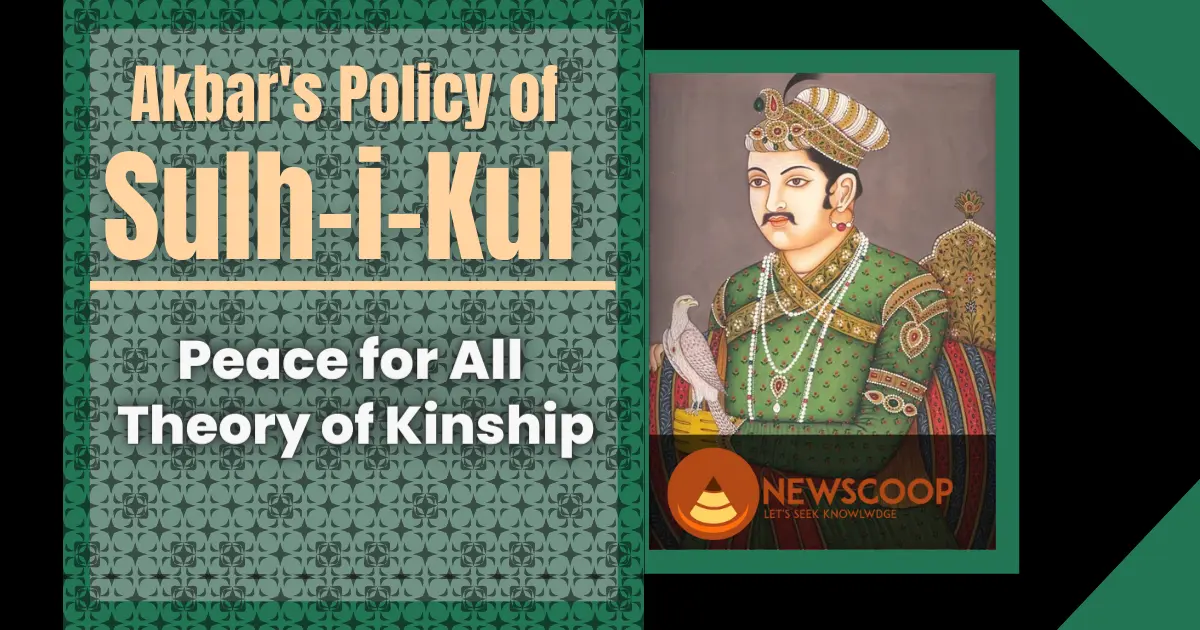In this article, you will get to know everything about Akbar’s policy of Sulh-i-Kul. Further, the main features of Sulh-i-Kul will also be discussed. This topic is very important for the UPSC exam.
| Policy | Sulh-i-Kul |
| Objective | Peace for All |
| Started by | Akbar |
| Principle | Theory of Kinship |
What is Sulh-i-Kul?
Sulh-i-Kul is an Arabic word, which means Peace for All or Universal Peace. Further, it is drawn from Sufi mystic principle and this doctrine was central to Akbar’s Theory of Kinship. Akbar adopted the policy of Sulh-i-Kul to establish a friendly & cooperative relationship with people due to the high cultural diversity in India.
According to Abu Fazl, the heart of the king is a depository of divine light i.e Farr-i-Izadi and this divine light enables the King to distinguish between right and wrong. That is why Akbar wanted to create a political institution that would judge people equally before the law regardless of caste and religion. So, Sulh-i-Kul became Akbar’s method of judging what was legally right or wrong within the Mughal empire.
Objectives of Sulh-i-Kul
- Promote religious tolerance
- Reduce conflict between different religious and cultural groups
- Create a harmonious society based on tolerance and mutual respect
- Abolish discriminatory laws
- Promote interfaith dialogue
- Encourage cultural exchange
- Strengthen the Mughal Empire
- Create a sense of unity among the people of India.
Main Features of Sulh-i-Kul
- Universal Peace
- Theory of Kinship
- Inclusive in Character
- Promotes Meritocracy
- Akbar’s Rajput Policy
- Integrated Non-Muslims
- The idea of the welfare state
- Abolish civil disabilities
- Stopped force conversion
- Separation of State and Religion
- Common laws for Muslims & Hindus
Implementation of Sulh-i-Kul
Talking about Todar Mal, he was not from any royal family but was an expert in the revenue office and later became an expert in military affairs, which is why he was also given the post of Diwan.
Moreover, Birbal also became Akbar’s favorite, and all of them did not belong to any royal family, but on the basis of their ability, they all rose to the top of Akbar’s kingdom. So in Akbar’s time, there were Navratnas, people handling important portfolios who did not actually belong to any nobility.
Akbar’s simple logic was that no one can come between God and the true ruler. This means god sent Akbar to take care of the people on his side. So, it was always in Akbar’s mind that he should keep love in his heart towards the people, and neither should there be any discrimination between the people.
Akbar brought able Hindus into the nobility and established matrimonial relations with many Rajput kings. Moreover, he started a kind of personal relationship with Rajputs by giving them high Mansabs.
To establish understanding between Hindus and Muslims, Akbar got many religious works of literature translated from Sanskrit to Persian and promoted the local language. Further, he established such a bond that people do not fight with each other in the name of Religion.
Akbar tried to change things at the ground level, first he abolished Jizya which was imposed on non-Muslims. Although there was not much tax in Jizya, Hindus felt that they were being discriminated against on the basis of religion.
After that, Akbar removed the Pilgrim tax, which was taken from Hindus when they used to go to holy places like Prayagraj, Banaras, etc. Further, he gave equal rights to every citizen irrespective of the religion he/she belongs to.
All these together constituted a Policy of Sulh-i-Kul.
Thank You!
What is Sulh-i-Kul?
Sulh-i-Kul is a Persian term that translates to “universal peace.” It was a policy implemented by Mughal Emperor Akbar in the 16th century, which aimed to create a society based on tolerance and mutual respect, regardless of religious or cultural differences.
What was the main objective of Sulh-i-Kul?
The main objective of Sulh-i-Kul was to create a harmonious society where people of different religions and cultures could live together peacefully. It was a way to promote religious tolerance and reduce conflict between different groups.
What was the impact of Sulh-i-Kul?
Sulh-i-Kul had a significant impact on Indian society. It helped to reduce religious and cultural conflict, promoted tolerance and mutual respect, and created a sense of unity among the people of India. It also helped to strengthen the Mughal Empire by bringing people of different backgrounds together.
Related Links:








